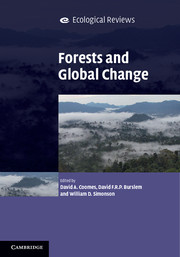Book contents
- Frontmatter
- Contents
- List of Contributors
- Preface
- Chapter One Forests and global change: an overview
- Part I Forest dynamics and global change
- Chapter Two Forests and the climate system
- Chapter Three Global change and Mediterranean forests: current impacts and potential responses
- Chapter Four Recent changes in tropical forest biomass and dynamics
- Chapter Five Disequilibrium and transient dynamics: disentangling responses to climate change versus broader anthropogenic impacts on temperate forests of eastern North America
- Part II Species traits and responses to changing resource availability
- Part III Detecting and modelling global change
- Index
- Plate Section
- References
Chapter Two - Forests and the climate system
Published online by Cambridge University Press: 05 June 2014
- Frontmatter
- Contents
- List of Contributors
- Preface
- Chapter One Forests and global change: an overview
- Part I Forest dynamics and global change
- Chapter Two Forests and the climate system
- Chapter Three Global change and Mediterranean forests: current impacts and potential responses
- Chapter Four Recent changes in tropical forest biomass and dynamics
- Chapter Five Disequilibrium and transient dynamics: disentangling responses to climate change versus broader anthropogenic impacts on temperate forests of eastern North America
- Part II Species traits and responses to changing resource availability
- Part III Detecting and modelling global change
- Index
- Plate Section
- References
Summary
Introduction
The planet was once much more forested. As human populations have grown, the forests have been cleared to make way for crops and livestock. This conversion from forest to agriculture started in Neolithic times (Brown 1997) but accelerated during the European colonisation of North America and other territories. Since the 1970s, it has continued apace in the tropics. The need to produce food is not the only cause of deforestation: humans have always used timber as fuel and as a raw material for construction. They will continue to do so, whilst new threats are likely to emerge: for example, in recent years tropical forests and woodlands have been cleared to make way for biofuel crops and plantations. These changes are causing widespread concern, as they may bring short-term benefits at the expense of the sustained provision of ecosystem goods and services (Foley et al. 2007).
Since 1990 the world’s forests have shrunk from 28.6% to 27.6% of the land surface, with substantial shrinkage in the tropics and slight expansion in the temperate regions (calculated from FAO 2011). Overall, we expect to see a continuation of this trend as human populations continue to expand and economic development proceeds.
- Type
- Chapter
- Information
- Forests and Global Change , pp. 21 - 46Publisher: Cambridge University PressPrint publication year: 2014

